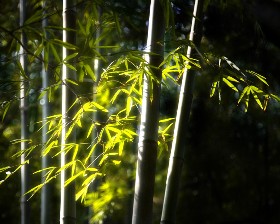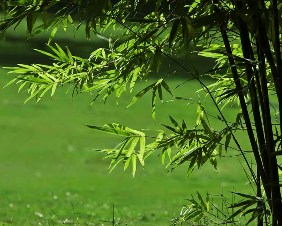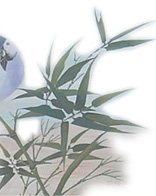|
 Listen to Shirley Singing the Poem in Chinese Jan 16, 2010 Listen to Shirley Singing the Poem in Chinese Jan 16, 2010
 Listen to Shirley Singing the Poem in English Jan 16, 2010 Listen to Shirley Singing the Poem in English Jan 16, 2010
 Listen to Shirley Explaining the Poem & Follow Me to Read It Listen to Shirley Explaining the Poem & Follow Me to Read It
 Follow Shirley to Read the New Words & the Poem in Chinese Follow Shirley to Read the New Words & the Poem in Chinese
 Learn the Meaning of the Poem & Yong Wu Poem Learn the Meaning of the Poem & Yong Wu Poem
 See Shirley Created Paintings for the Poem March 22-23, 2012 See Shirley Created Paintings for the Poem March 22-23, 2012
 See Shirley Created Picture for the Poem Jan 09, 2010 See Shirley Created Picture for the Poem Jan 09, 2010
 About the Poet About the Poet
Liu Yuxi (772 -842) was a writer, poet, politician and philosopher in the metaphase of Tang Dynasty (618 - 907).
Liu's ancestral home was in Luoyang, todayвАЩs capital of Hebei Province and moved to the South of the Yangtze River in the Rebellion of An and Shi, and he was born in to the scholar-official family in Jiaxing, today's Jiangsu Province.
When he was 19 years old, he went to the capital - Changan, modern day Xian and gained the title of Jinshi as a successful candidate in the highest imperial examination at the age of 21. He then passed another two imperial examinations and was given an official position ?Tai Zi Jiao Shu, to check and to order the books in the Chong Wen Guan that was serviced the prince.
During his life, he was given at least twelve positions, such as the official as the imperial supervisor of inspecting, and he was also demoted from the capital several times and appointed to the position of provincial or prefectural governor at least 7 times.
Liu Yuxi made four major contributions to Chinese culture:
As a philosopher, his representative work Tian Lun indicated the corporality of heaven, the relationship between heaven and human beings, nature and human beings and so on. It is one of the most important works in Chinese classical philosophical system.
As a politician, Li Yuxi was one of the main supporters of the Yongzhen Reform that mainly opposed the eunuchs grabbing the political power, and the military governorsвАЩ separatist regimes. The reform failed and as a result he was demoted again and again....
However, the many demotions and position changes gave him the opportunity to study society and the common people.
As a writer, he thought that literature should reflect the social reality and learn from the tradition of "Yue Fu ? folk song/ folk poetry" from the Qin dynasty (221 B. C. - 206B.C.) and popular in the Han Dynasty(206 B.C. - 220 A.D.), to learn from the first great poet in China -- Qu Yuan (about 340 B.C. - 278 B.C), to get spiritual nutrition from folk literature, art and music.
His representative essay -- Lou Shi Ming, has become one of the most famous ancient articles and has been read and recited by Chinese students to the present day.
As a poet, he introduced many innovations not only in poetic style but also in the way he introduced fresh ideas and topics into his poems. His poems covered a wide range of subjects, mainly reflecting people's lives and folk customs and are full of emotion realism and folk breath.
Some of his political poems lashed out at the influential officials who ordered the suppression of Yongzhen Reform and thus brought many troubles on himself.
His accomplishments in philosophy and literature gave him the same reputation as Liu Zongyuan(773вАХ819) and became called "Liu Liu". Also, because of his success in poetry, he was called "Liu Bai" together with Bai Juyi (772вАХ846) in his own time.
About Yong Wu Shi
The poem, Ting Zhu, is a Y«Тng W√є ShƒЂ - Y«Тng means chant; W√є means thing or matter; ShƒЂ means poem. Y«Тng W√є ShƒЂ is a poem that expresses peopleвАЩs aspirations, emotions or humanity idea through chanting about some thing / object.
In a Y«Тng W√є ShƒЂ, anything in nature, a mountain, a river, a flower or a tree can be written about, described and chanted. To compare to the poet itself, both of the thing and the author are integrated together totally. Usually, the author writes his Y«Тng W√є ShƒЂfor expressing his attitude towards life, beautiful wishes, philosophy of life and sentiment.
Y«Тng W√є ShƒЂ is a wonderful poem in Chinese traditional poetry. The ancient Chinese enjoyed chanting things ? to describe things via poems. According to statistics, in Quan Tang Shi -- Complete Tang Poems, there are 6021 Y«Тng W√є ShƒЂ in all of the 49,403 (in another version there are 42863) Tang poems, it makes 8.2% of the total. The interesting thing is : 3556 of them were written in later Tang. Therefore, I think that maybe people enjoyed writing Yong Wu Shi, for they would like to express their true thoughts and feelings indirectly in the complex situations.
 Enjoy the Poem Enjoy the Poem
First of all, let us consider the title Ting Zhu --пљФ√≠пљО? means courtyard, law court or court, zh√Ї means bamboo. On the surface, we can think of the meaning of the title as just chant, 'bamboo in the courtyard'. However, after we recall the life and career experience of Liu Yuxi, after we have learned something about Yong Wu Shi then, I guess, maybe you have another idea. In my opinion it has, perhaps, three meanings:
-- ( Chant ) the bamboo in the courtyard;
-- ( Chant ) the gentleman as a bamboo in the court;
-- (Chant) the poet himself as a bamboo.
The first line: l√є d√≠ qiƒБnhu√° ji√© ? the dew has cleaned the bamboo nodes.
L√є, means dew; d√≠ means cleanse, wash; qiƒБnhu√° (another version is qiƒБn fƒЫn) means a cosmetic or something used in makeup; ji√© means the nodes of the bamboo.
This line points out the first character of the bamboo -- What the bamboo could accept and to clean his body was just the dew in the early morning. It makes me think of the lines by the first Chinese poet Qu Yuan n his long poem Li Sao:
the first great Chinese poet Qu Yuan ( 340 / 239 B.C. ? 278 B. C.) wrote in his long poem Li Sao -- Zhao yin mu lan zhi zhui lu xi, xi can qiu ju zhi luo yin -- what he ate in the morning was the dew that dropped from the flower of the magnolia, what he had in the night was the petals of the chrysanthemum in the autumn.
I am thinking that maybe here, Liu Yuxi would like to tell us that what the person who is like the bamboo has learned and absorbed is the cleanest and noblest thing in the world. Just as the bamboo has used cleanest dew to clean his body, there is nothing that is unnatural or affected, but keeps his natural personality.
The second line : fƒУngy√°o qƒЂngy√є zhƒЂ -- the wind is swaying his green jade branches.
FƒУng means wind; y√°o means sway; qƒЂngy√є means the color of the bamboo just like green jade; zhƒЂ means branch.
This line praises the good features of the bamboo, just like a beautiful girl, waving her beautiful branches.
The third line: yƒЂyƒЂ s√ђ f≈Ђz«РвАХ with natural and graceful features and manners, you are just like a gentleman.
YƒЂyƒЂ means the supple (twigs) and tender (leaves) branches are swaying in the light wind, hints how gentle and tender are the characterstics of the person who has the similar quality to a bamboos. S√ђ means like; f≈Ђz«Р is an ancient respectful form address to a Confucian scholar or to a master by his disciples, here means gentleman and points the poet himself.
This line admires the good surface of the bamboo and helps people make a connection between the good feature of the bamboo and the character of a gentleman.
Last line: w√Ї d√ђ b√є xiƒБngy√≠ -- No place is inappropriate; everywhere is appropriate; here means that bamboo can live in any place, just like a gentleman is welcome everywhere.
w√Ї means no, not; d√ђ means place; w√Ї d√ђ means nowhere, no place; b√є means do not, not ; xiƒБngy√≠ means suitable, appropriate. This line states the feeling frankly, to admire the bamboo for its strong vitality and ability to live in every environment.
As I have told you, on surface, a Yong Wu Shi chants thing, but, its purpose is to express the emotions, ideas, or thoughts of the author. In this poem, when it praises the bamboo as being just like a gentleman, welcome everywhere, in fact it says:
Just like the bamboo, the gentleman who has absorbed the prime and best knowledge and thoughts of the world has the natural and clean personality; he is beautiful inside, and as with the bamboo, he has also the graceful features outside and especially has a strong vitality and can flourish anywhere.
Let us think, since Liu Yuxi had been demoted many times for his political ideas, but he was used by the court again and again as an official on many important positions in many places, that meant he did have the ability to adapt himself to the different circumstances and to be welcome everywhere. Also, hints his determination that would never give up in any bad situation.
Now, maybe, you will understand why Chinese people so love bamboo and why bamboo is an important part in Chinese culture.
As most Chinese people, I love bamboos, not only for it being a symbol of straightness, honesty and modesty like a gentleman, but I also, I enjoy its features as a beautiful girl.
Therefore, as soon as I read this poem for the first time, I created a piece of music to go with it and sang it in Chinese in 2006; then in 2007, I re-wrote the music; in 2010, I created two paintings to go with the music and I retranslated it and sang it in Chinese and in English for the first time.
In 2012 at CANN in Beijing, I painted it again for the for 4th time, and I re- translated and re-sang it by the good help from my music, language and painting tutors.
I really hope our effort will be some help with you to learn Chinese culture and Chinese language.
The Main Meaning of the Poem :
Ting Zhu
By Liu Yuxi (Tang )
The dew has cleaned the bamboo nodes,
The wind sways the green branches.
The Naturally graceful you are like a gentleman,
Everywhere you are welcome.
Chinese Characters and Pronunciations
You can clink any Chinese Character to open the New Character Board and to see its Chinese pinyin, meaning, pronunciation and follow me to read it, also, you can hit the links over to enter the Painting Column,or you can directly enter the art notes on the painting that I created for this poem to see my painting and art notes for the poem
еЇ≠зЂє -- ting zhu
еИШз¶єйФ° (еФР) -- liu Yuxi (Tang)
йЬ≤洧йУЕеНОиКВ -- lu ti qianhua jieпЉМ
й£ОжСЗйЭТзОЙжЮЭ -- feng yao qingyu ziгАВ
дЊЭдЊЭдЉЉе§Ђе≠Р -- yiyi si fuziпЉМ
жЧ†еЬ∞дЄНзЫЄеЃЬ -- wu di bu xianyiгАВ
 If you have any questions, comments and suggestions, please write to shirley@ebridge.cn or shirleyz004@yahoo.com. You are welcome to publish your opinions in Message Board as well. If you have any questions, comments and suggestions, please write to shirley@ebridge.cn or shirleyz004@yahoo.com. You are welcome to publish your opinions in Message Board as well.
Shirley Zhang
March 26, 2012/ Jan 17, 2010/ Oct 7, 2007/ Jun 10,2006
|

